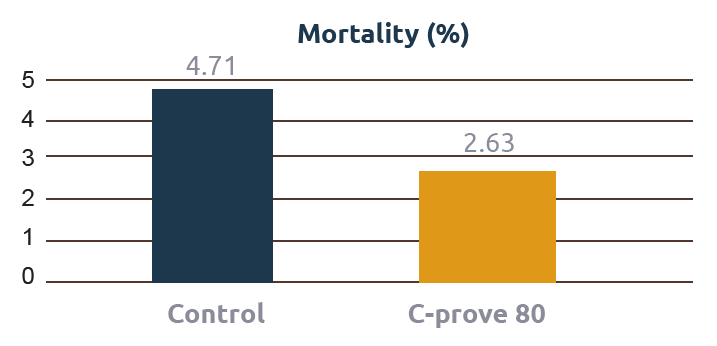When it comes to poultry production, feed and water are a double-edged sword. They can provide birds with essential nutrients or harbor pathogens that cause them to perform poorly. The reduction of pathogen infection in animal production is a key element in any strategy aiming to minimize the development of antimicrobial resistance.
Intestinal inflammation
Intestinal inflammation occurs as a result of bacterial invasion of the intestinal mucosa, damaging the epithelial cells with their toxins and triggering a cascade of immune reactions. These reactions end up causing growth depression in birds because of the increased demand for energy and protein by the immune system rather than for building muscles.
Interestingly, the bacteria that causes intestinal inflammations can also be the natural bacteria in a bird’s gut. However, due to bacterial contamination of feed and water, an imbalanced microflora can develop and result in poor performance because of pathogens causing:
- Increased diarrhea and wet litter
- Higher incidences of foot pad dermatitis and hock burns
- Poor animals welfare
- Reduced growth rate and FCR
- Greater use of antibiotics
The role of MCFAs in supporting gut integrity
Due to their high antimicrobial properties against both gram-positive and gram-negative bacteria, medium-chain fatty acids (MCFAs) are commonly used in poultry feed. They help contribute to fewer pathogens imposing stress on the birds’ immune systems and support the gut microbiome balance.
During the first days of life, intestinal cells use MCFAs as a quick energy source to support villus development for better nutrient absorption capacity. Furthermore, the application of MCFAs increases the production of volatile short-chain fatty acids in the cecum, contributing to less proteolytic fermentations and wet litter.
Why focus on MCFAs in water
Compared to feed, water is consumed at twice the amount. In fact, approximately 70% of a bird’s body weight is composed of water and is vital for all body functions. Therefore, poultry producers use the water system to add pharmaceuticals and nutritional supplements whenever a quick and safe intervention is necessary.
In this regard, taking advantage of the antimicrobial properties of MCFAs in drinking water systems can help poultry producers achieve a variety of different objectives:
- Enhancing water quality
- Boosting animals’ health by reducing the risk of pathogen infections
Enhancing water quality
Due to the fact that contaminated water systems are believed to increase birds’ susceptibility to intestinal inflammation, providing clean water is essential in any poultry production. To support clean drinking systems, Agrimprove developed Eubisol, a water-soluble mix of free-active MCFAs and short-chain fatty acids to improve water quality.
In a trial, the use of Eubisol in drinking water at a dose of 1/1,000 L was shown to lower the pH level in the water. This drop in pH can increase the antimicrobial potential of Eubisol’s ingredients against different types of microbes. The trial found that Eubisol has greater antimicrobial properties in a shorter killing time than organic acids alone or disinfectants like H2O2 (Table 1).
| E. coli | Aspergillus | |
|---|---|---|
| H2O2 | 32 | 33.5 |
| Organic acids | 29 | 43.5 |
| Eubsiol | 37.8 | 44.5 |

Boosting bird health
For times of high stress or increased pathogen load, Agrimprove developed C-prove 80. This product is designed to be used during the first week of age and repeated whenever needed at a mix rate of 1/1,000L. The product aims to exploit the antimicrobial properties of MCFAs to reduce the risk of gram-negative pathogens like E. coli or Salmonella in day-old chicks, which can reduce the overall use of antibiotics in poultry production.
A study (KU Leuven) was done comparing a control group against a C-prove 80 group where the product was added to the drinking water from d 0 to d 10 and from d 18 to d 21. The study found that using C-prove 80 in the first week resulted in a reduction of the mortality rate by 44.5% (Figure 1).

In addition to the enhanced gut integrity, applying C-prove 80 between 18 to 21 days of age resulted in better litter quality and fewer foot pad lesions in broilers. When comparing trial houses, the litter in the control house was wetter and had a higher percentage of birds suffering from advanced foot pad lesions above score 1 (Figure 2).

As a result of broiler health improvement with C-prove 80, the feed conversion rate improved up to 4 points in the finisher phase. Besides the better uniformity and animal well-being, a higher meat yield of 2% per m2 was found. This demonstrates that C-prove 80 can support reduced antibiotic use while also increasing performance.
Summary
The application of MCFAs in drinking water can give poultry producers an additional tool to promote animal welfare and minimize the risk of bacterial infection. This can be achieved by using the right products for the right objective: improving water quality or supporting animal health. The free-active MCFAs found in Eubisol and C-prove 80 are commonly used in the poultry industry but their effects vary according to the compositions of the products. Eubisol directly affects water sanitation whereas C-prove 80 affects the digestive system—where the most influence on animal health can be achieved. As a result, the target of producing better food quality, with less use of antibiotics, is easier to attain.